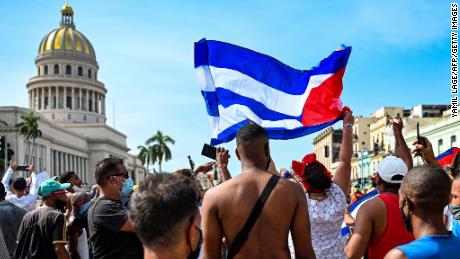In less than one week, this kind of call to action was made relative to not one, but two, unfolding crises in the Western Hemisphere.
In the immediate wake of the assassination of Haiti’s President Jovenel Moise, one of the country’s interim prime ministers, Claude Joseph, called on the United States to deploy troops to the western third of Hispaniola to secure critical infrastructure and enhance stability.
Days later, as unprecedented crowds of valiant Cubans rose up across the island to protest the country’s decrepit, authoritarian regime and the lack of food and medicine amid an ongoing economic crisis aggravated by the Covid-19 pandemic, some South Florida politicians formed a chorus calling on the United States to intervene militarily in Cuba.
Although they undoubtedly thought they were acting boldly, those who made these calls were instead engaged in the ultimate tell that they had no idea what the US should do. Or that they were political grandstanding. Or both.
There would have been no shame in silence on what the US should do. The situations in Haiti and Cuba are complex and immune to the kind of bold action people so desperately want when long-suffering populations, like Haitians and Cubans, are in such acute need of assistance.
The desire among certain politicians in the US and Haiti for the US government to somehow sweep in and rescue people from economic and political depredation is undeniable, especially when the events in question are unfolding in the “US’ near abroad,” in countries where it has historically not hesitated to intervene.
The hard, simple truth is the United States is not going to be the primary engine of political change in either Haiti or Cuba. Meaningful, durable political change in both lies in the hands of the populations themselves. That also requires time as the ability of those populations to set their respective paths forward is hampered, in the case of Haiti, by the legacy of a predatory state followed by an absent one and, in Cuba’s case, by the repression of a long dictatorship.
There is no big-bang action from the United States that will remove either of those impediments. Instead, and although it feels profoundly frustrating in such urgent times, the path for US action is far more deliberate and patient.
In the case of Haiti, the United States needs to send an unmistakable message to all who are looking to Washington to play kingmaker that those days are behind us. The burden of navigating an exceedingly complex political moment in which the country has only 10 legitimately elected officials is on Haitians.
The United States — and other members of the international core group — can and should play a role in bringing the country’s political, civic, and private sector leaders together to chart a path to and through free, fair, and transparent elections. It should not seek to impose decisions on those actors.
The US, together with key international partners, including Canada and the European Union, can and should also help alleviate the humanitarian situation in Haiti, especially as it relates to the vastly undercounted spread of Covid-19, according to experts. Helping foster political consensus and relieving some humanitarian burden should help Haitians forge a path forward and help avoid the humanitarian catastrophe that would be a maritime mass migration akin to those seen during Haiti’s last protracted political crisis in the early 1990s.
In the current environment, empowering the Cuban people to determine their own future feels perhaps even trickier. Those who believe a social explosion in Cuba is the only path forward are already trying to box President Joe Biden’s administration into further prolonging President Donald Trump’s misguided crackdown on Cuban Americans supporting Cubans on the island in the hopes the pandemic plus enforced family division will create enough pressure to bring down the regime.
Although the end of the regime is the desired end-state, history tells us intense pressure on the island results in two outcomes only — maritime mass migration and/or a harsh clampdown on civic activity blamed on US policy. Neither of those outcomes is in the US national interest nor in the interest of the Cuban people.
Despite political posturing by some in South Florida, the time is now for the United States to embrace an approach that engages and empowers the Cuban people, like the one that paved the way for the internet connectivity that allowed the images of the Cubans’ struggle to go viral, fueling the recent uprising. The US should extend a confident hand to the Cuban people in support of their fundamental rights and most basic needs and desires.
Calls for action must be answered; wisely and always in service of US national interests, even if the means for doing so feel unsatisfactory in the moment.






